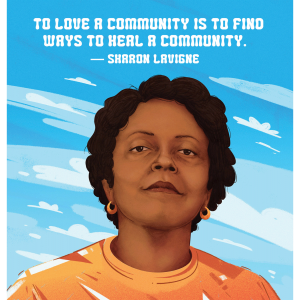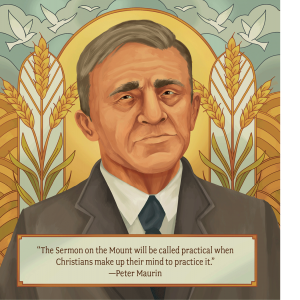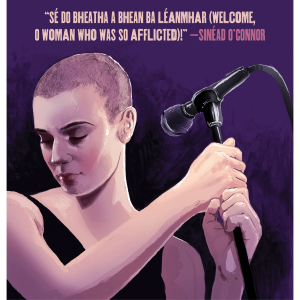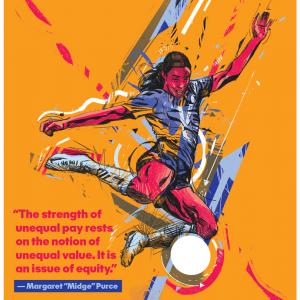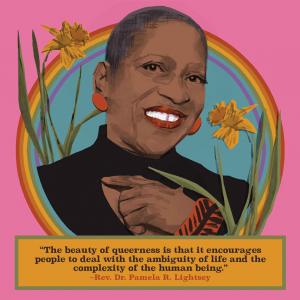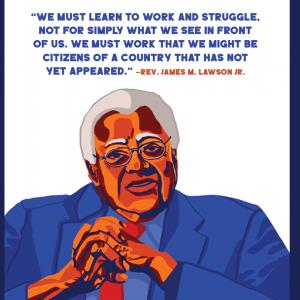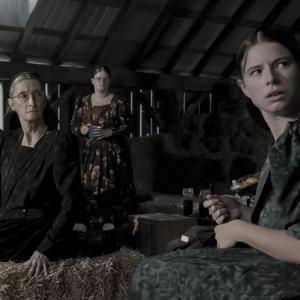Posts By This Author
What Lent, Valentine's Day, and Activists in Sports Have in Common
Standing up against abusive power on behalf of an ethos of love.
AT FIRST GLANCE, the congruence of Valentine’s Day and the beginning of Lent seems, well, incongruent. The first is culturally associated with hearts and chocolates, the latter with fasting and spiritual examination. But it turns out that the two have some deep overlays. The Feast of St. Valentine honors a third-century bishop who defied the Roman emperor and married young couples in secret, for which he was imprisoned and later executed, and for which he is remembered as the patron saint of love.
New and Noteworthy: Black Feminism, ‘That Tooth Nibbling at Your Soul,’ and Jamila Woods’ New Album
Three culture recommendations from our editors.
Poured Out
Singer-songwriter Jamila Woods draws on themes of spirituality and racial justice to create music at once urgent and transcendent. In her new album, Water Made Us, she sings, “Here comes the flood, I’ll save a place for you. / And when it’s all said and done / I hope you send a dove.” Jagjaguwar
Nonviolence Amid the Carnage of War
The message of Palestinian peacemaker Ali Abu Awwad is more crucial than ever.
WE BEGIN PLANNING each issue of the magazine months in advance, and this edition was no exception. Our conversations about Christian nonviolence last summer were rooted in our long history of wrestling with questions of how to put our biblical faith into practice in the face of challenging, real-world problems. Our goal, as always, is to offer a word that is both “timeless and timely,” and the combination of John Dear’s biblical reflection on Mary’s role as a “teacher of nonviolence” and our interview with Palestinian peacemaker Ali Abu Awwad seemed exactly that.
New & Noteworthy: Artificial Wombs, ‘Authentic Unity,’ and More
Three culture recommendations from our editors.
Futuristic Dilemmas
In the film The Pod Generation, parents-to-be pay top dollar to gestate a fetus in an artificial womb outside the body, a commodification that more equally distributes the responsibility of pregnancy between males and females. But every technological advancement brings new moral quandaries. Scope Pictures
The Power of Rest in a Time of Violence
For many around the world, especially those being forced from their homes, there is little opportunity for rest this Advent season.
As we go to press, violence again erupts in the Holy Land. In the season of Advent, we prepare for the birth of the Prince of Peace in a rough shelter in a Palestinian village and hear again God’s ancient promises first given to the Hebrew people. But all is not calm in Bethlehem, Jerusalem, Gaza, or Ashkelon. The agitations of injustice and fear have turned a season of dreams into one of nightmares.
New & Noteworthy: Horror in the Bible, ‘They Cloned Tyrone,’ and More
Three culture recommendations from our editors.
A Sci-Fi Dark Comedy
They Cloned Tyrone is both hilarious and harrowing in its depiction of a drug dealer, sex worker, and pimp who suspect the U.S. government is experimenting on their community. The film shows how, too often, Black people must choose between assimilation or annihilation. Netflix
Echoing God's Economy of Generosity
Economic sharing in community can be liberating, empowering, and biblically faithful.
For a decade or so, beginning in the 1970s, members of the intentional Christian community that founded Sojourners magazine practiced a form of economic sharing we called the “common pot” — all our income was pooled for the good of the whole community. In doing so, we sought to model ourselves after the practices of the early Christian church, the first followers of Jesus, as described in Acts 2 and 4 — “All who believed were together and had all things in common” (Acts 2:44); “Now the whole group of those who believed were of one heart and soul, and no one claimed private ownership of any possessions, but everything they owned was held in common” (Acts 4:32).
Can Churches Be Healers of Church-Rooted Trauma?
Religious communities have a role to play — and a responsibility — in the journey of healing.
FOR MATTHIAS ROBERTS, and many others, growing up in the church was a traumatic experience. His childhood churches, he writes in our cover feature, were “filled with people who weren’t afraid to tell me I needed to become straight for God to save me from hell.” The effect of such “adverse religious experiences,” as Roberts explains, goes far beyond the immediate harm done to individuals in these settings and can linger deep into their adult lives. That trauma can be triggered by any church experience, even in a supposedly safe and affirming context — another reminder that what happens in any branch of the body of Christ affects the integrity and witness of the whole of the church.
Journalist Gabriel Pietrorazio writes about another kind of church-related trauma, that stemming from what Pope Francis called the “cultural destruction and forced assimilation” of residential schools, often church-run, that many Indigenous people in the U.S. and Canada were made to attend. While there isn’t a clear or easy map to healing for the survivors of religious trauma, one necessary component is the presence of a loving, compassionate community — it’s not a journey to be undertaken alone.
New & Noteworthy: Ancestral History, ‘The Secrets of Hillsong,’ and More
Three culture recommendations from our editors.
Beyond the Scandal
The Secrets of Hillsong draws on the reporting that exposed misconduct at the Hillsong megachurch. The docuseries goes beyond the headline scandals to explore patterns of abuse engrained in Hillsong’s history and asks what rebuilding looks like in the aftermath of scandal.
Hulu
New & Noteworthy: ‘BlackBerry,’ Overlooked Christians, and More
Three culture recommendations from our editors.
Capitalist Cautionary Tale
BlackBerry highlights the role of greed in capitalism through the story of the rise of the BlackBerry smartphone. The film, which transports us to a time when smartphones weren’t omnipresent fixtures in our lives, shows the danger of valuing innovation more than ethics.
Elevation Pictures
Taking On the Money Changers
Christian discipleship is inherently about choosing sides.
CHRISTIAN DISCIPLESHIP is inherently about choosing sides. Yes, some might harbor a temptation to take the supposedly safer path of remaining “neutral,” but that's a delusion: Such alleged neutrality always favors the status quo. To paraphrase Edmund Burke, if good people don't choose sides, the “side” with power and wealth will always win. Or as Lutheran pastor Korla Masters puts it in this issue, “Jesus invites ... us to whole lives of asking ourselves which side we are on and whole lives of answering that our entire selves belong to the kingdom of heaven.”
Real Progress Requires a Prophetic Perception
Your eyes can deceive you. Don't trust them as the only way to perceive the path ahead.
MANY SCRIPTURAL METAPHORS for transformation involve variations on the “open my eyes that I may see” plea of Psalm 119; the writer of Ephesians 1, for instance, prays for the enlightenment of the “eyes of your heart” so that “you may know the hope to which he has called you.” Various authors in this issue wrestle with similar images. For example, our Prelude, which draws on the writings of French Jesuit Pierre Teilhard de Chardin, refers to the “worst failing of our minds” as the inability “to see the really big problems” that “are right under our eyes.”
Much of our culture, Zachary Lee explains in his cover feature on Hollywood “spectacle,” serves to distract us from those “really big problems” and makes it difficult for us to see in different, more hopeful ways. Bible savant Walter Brueggemann, who knows a thing or two about alternative ways of perceiving, said that prophets “are able to imagine the world other than the way that is in front of them.” But that task, that “prophetic imagination” of seeing with enlightened eyes, isn’t reserved just for prophets: It’s really an invitation to all of us who seek a better world.
New & Noteworthy: Sinéad O’Connor, ‘Tell Her Story,’ and More
Three culture recommendations from our editors.
The Sinéad Effect
Nothing Compares documents the tumultuous career of Irish musician Sinéad O’Connor. On live TV in 1992, O’Connor protested child abuse in the Catholic Church, nearly a decade before papal acknowledgment. Her actions jeopardized her career, but she clung to music as a form of healing.
Showtime
New & Noteworthy: Superhero Theology, ‘Extrapolations,’ and More
Three culture recommendations from our editors.
New Earth?
The TV show Extrapolations, featuring Meryl Streep and Forest Whitaker, offers eight terrifying visions of how climate-changed humanity’s unchecked consumption will harm Earth. The interwoven stories aim to inspire climate action, even as they disturb.
Apple TV+
Pop Culture Can Shape Our Reality
Our stories can profoundly influence how we see the world — and make it a more just place.
POPULAR CULTURE PLAYS an important role in shaping our view of the possible. Ta-Nehisi Coates, author of Between the World and Me, for years wrote Marvel’s Black Panther and Captain America comics. “I think we don’t always realize the extent to which the culture actually interacts with politics,” Coates said on Ezra Klein’s podcast. “I could advocate for all of the policies in the world ... but it really, really occurred to me that there’s a generation that is being formed right now that’s deciding what they will allow to be possible, what they will be capable of imagining. And the root of that isn’t necessarily the kind of journalism that I love that I was doing, the root of that is the stories we tell.”
In this issue, sojo.net associate news editor Mitchell Atencio looks at some of those stories — in particular, superhero comics — and explores what is not being told, and how pop culture often avoids grappling with the way our country approaches issues such as policing and incarceration. That failure has consequences far beyond the DC and Marvel universes.
New & Noteworthy: ‘Saint Omer,’ Christian Climate Care, and More
Three culture recommendations from our editors.
Humanizing the Harrowing
The French film Saint Omer follows the trial of a Senegalese woman accused of murdering her child. The docudrama is a condemnation of the criminal legal system, and a reminder that no one is the totality of the worst thing they’ve done.
Les Films du Losange
‘It May Not Look Like It, but Love's In Charge’
Despite the seemingly insurmountable reality of racial injustice, we must remember that God is love.
WHEN VILLANOVA PROFESSOR Vincent W. Lloyd reflects on the theology of the phrase “Black Lives Matter,” he begins with the “death-dealing forces of white supremacy” and the tragic “ vulnerability to premature death” experienced by Black people. But Lloyd doesn’t stop there. To affirm the value of Black lives, Lloyd writes, requires life that is rich, creative, and flourishing.
Lloyd doesn’t think such flourishing is possible without faith. Specifically, he argues that to hold on to “a hope against hope” in the face of these noxious, murderous systems and practices requires belief in the possibility of life after death: “For Black life to matter,” Lloyd writes, “we must believe in resurrection.” As Carmen Acevedo Butcher puts it in her interview with Betsy Shirley, “It may not look like it,” but “Love’s in charge.” That’s an important reminder for all of us, in this Easter season and always.
On a lighter note: We’re pleased to have a guest appearance by our former art director (and humor columnist) Ed Spivey Jr., who came out of retirement to offer his pearls of wisdom on artificial and other kinds of intelligence.
New & Noteworthy: God's Gender, ‘Women Talking,’ and More
Three culture recommendations from our editors.
Do We Stay or Do We Go?
Women Talking centers on Mennonite women wrestling with how to respond to serial sexual assault by men from their colony. The film explores the complexity of forgiveness and touchingly reminds viewers that leaving one’s community can be an act of faith.
United Artists Releasing
On Earth as It Is in Heaven
Scripture's view of a God-centered economy is at odds with the competitive system of acquisition and consumption known as capitalism.
IN THIS ISSUE, ethicist Larry Rasmussen explains that human economic activity has transformed not only our relationship to the world, but the world itself — we are now in an era where “everything turns upon humanity,” as Dietrich Bonhoeffer put it in a different context. While this new “totalizing” reality of what people are doing to the planet has become virtually undeniable, the human tendency toward unceasing growth, as Jim Rice points out in his column, is still defended by economists, headline writers, and the rest of the “more is more” crowd.
New & Noteworthy: Harriet Tubman's Mysticism, Riotsvilles, and More
Three culture recommendations from our editors.
Communal Sin
The psychological thriller God’s Creatures follows a mother who chooses to hide her son’s secret, a decision that has damaging ripple effects in her remote fishing village. The film explores how a community’s complacency in covering up sin can systematize and amplify evil.
A24


